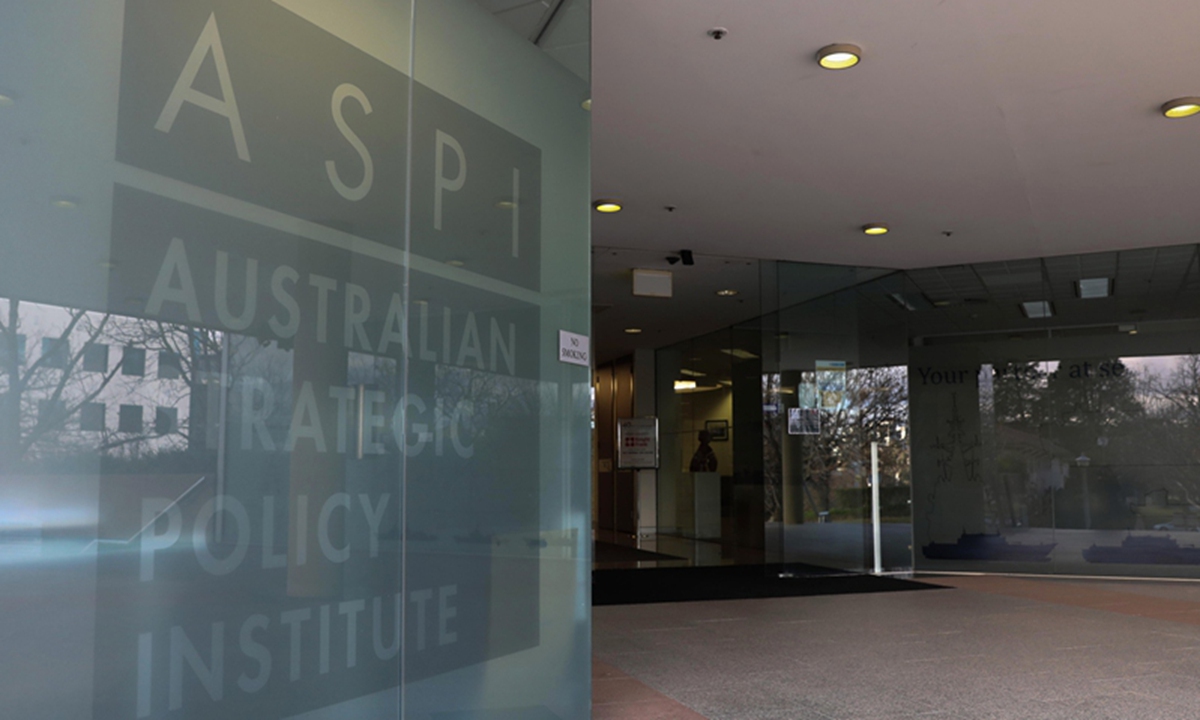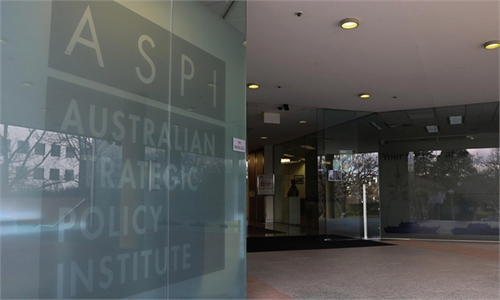ASPI’s ‘no compromise policy’ mirrors evil intentions to disrupt China-Australia ties

Photo taken on June 23, 2020 shows the logo of Australian Strategic Policy Institute in an office building, in Canberra, Australia.Photo:Xinhua
Justin Bassi, the Executive Director of the Canberra-based think tank Australian Strategic Policy Institute (ASPI), claimed Tuesday that the Australian government has gained "the upper hand diplomatically" regarding relations with China. According to him, this can be proven by the fact that China's dialogue with Australia has resumed on an "unconditional" basis, meaning that Australia has "made no compromises in its foreign policy, national security and defense settings."
Bassi is described in the Australian media as a "long-serving Liberal Party adviser." He served as national security adviser to former Australian prime minister Malcolm Turnbull and chief of staff to former foreign minister Marise Payne. After Scott Morrison succeeded Turnbull, the Australian government, under the Liberal Party, tilted more and more toward the US, showing increasingly apparent hostility toward China.
It can be said that Bassi's remarks demonstrate the typical attitude of the Australian Liberals toward improving China-Australia ties. After the Labor defeated the Liberal Party in this year's federal election, it seems now Bassi is so eager to speak up for the Liberals to implicitly warn the Labor government not to compromise with China, which would be a sign of weakness and submission to Beijing.
In bilateral relations, it is common for the two countries to negotiate and make concessions to find common ground, as long as the national interests of both sides are not undermined. Beijing has no historical problems or territorial disputes with Canberra. It just hopes the latter will adjust its China policy and stop jeopardizing China's national interests, rather than just repeating and imitating Washington's anti-China words and actions.
The ASPI chief has equated policy adjustment with compromise and then urged Canberra not to pursue this line of action. This is an attempt to set up and knock down a straw man. And it is absolutely unhelpful to the improvement of bilateral relations.
However, Bassi and ASPI may not be willing to see an improvement in bilateral ties, because the recent signs of such a positive development in the relations with China are obviously not in the interests of some anti-China forces in Australia or the US behind them.
ASPI is trying to force Canberra to continue pressuring China and show the anti-China forces at home and Washington that Australia is not "tilting toward China." It insists on creating obstacles to a better relationship with China, raising questions about whether the organization is simply an anti-China megaphone for Washington's strategic interests to produce public opinion ammunition against China.
Chen Hong, president of the Chinese Association of Australian Studies and director of the Australian Studies Centre at East China Normal University, told the Global Times that Bassi's claims about the resumption of the China-Australia dialogue on an unconditional basis are actually setting limits for a conversation between the two sides. In other words, dialogue should take place only if Canberra can maintain its previous suppression or containment measures against China.
Moreover, the Chinese scholar believes the "upper hand" rhetoric is entirely incorrect. Australia is currently on the verge of a severe economic crisis. The country is facing soaring inflation which could be at a 32-year high. Meanwhile, Canberra has vowed to increase foreign aid to Pacific island countries. Therefore, Australia is in more need of its largest trading partner China to achieve better economic and trade cooperation.
This "upper hand" rhetoric is simply an outright lie, trying to fool the Australian public and the international community. It also aims to instill blind confidence in Canberra that could mislead the Labor government's policy on China relations and allow the bilateral ties to continue to deteriorate. This would work best for the interests of ASPI and Washington.
Bassi was appointed as the Executive Director of ASPI in March by the former defense minister and hard-line China hawk Peter Dutton. He clearly has a motive to keep the relationship between China and Australia tense. Rationalists in Canberra should be wary of anti-China forces that can damage the prospects for bilateral relations.
"We hope the Australian government will treat China and its development more rationally and won't be compelled by anti-China public opinions. We are very much looking forward to the two countries meeting each other halfway or working together to strengthen the future of their bilateral ties," Chen noted.

